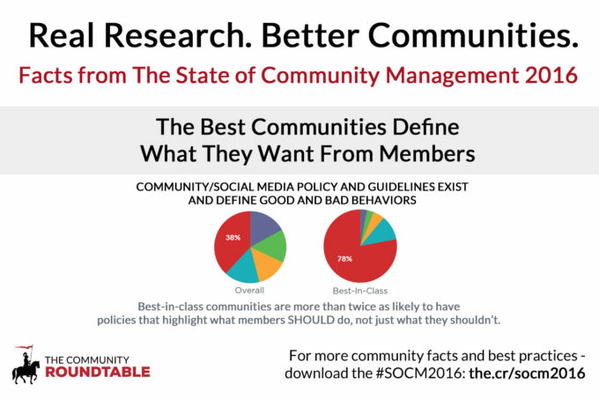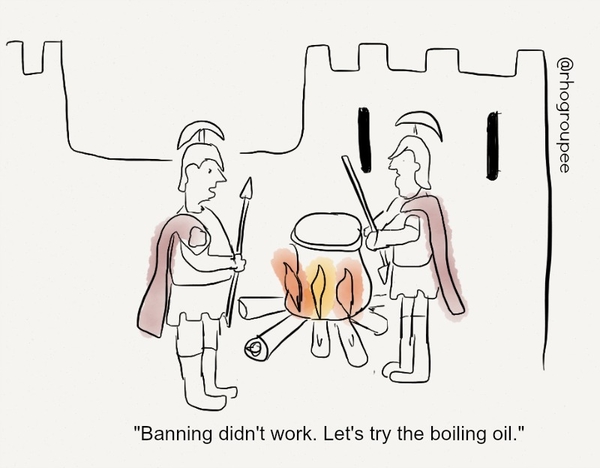The best community guidelines are brief, publicly visible, and written with support from community members themselves.
Typically, community guidelines are different from the Terms of Use/Terms of Service, which tend more toward legal language and often fulfill regulatory requirements. (In Crowdstack, you can use the Registration Settings area to tailor that messaging.)
You’ll sometimes hear community guidelines called a “code of conduct” or “behavior guidelines.”
Why Community Guidelines are Important
Clear, concise online community guidelines are important.
- Get your members off on the right foot when they join the community (setting expectations for behavior).
- They’re a useful tool for moderators managing engagement as the community grows beyond the initial members.
- Get everyone on the same page in terms of values and vision.
Here's what The Community Roundtable found out about guidelines in their State of Community Management Research a few years ago...
Community guidelines can crystallize values and ideals that bring the community members together.
That’s why I recommend focusing much more on the positive behaviors and actions you want to incentivize, and keeping the list of “don’ts” to the bare minimum.
Nobody is going to read a 5-page list of do’s and don’ts anyway.
When or How to Present Community Guidelines
During registration - when a new member is registering, you can ask them to agree to abide by the community guidelines as part of that flow. This is good because you’re drawing upfront attention to the tone and behavior expected. It can be a drawback if it’s too lengthy and puts friction into your registration flow.
Email drip for onboarding - you can include the community guidelines in your onboarding emails, either in the initial welcome or a few days later. Be sure to frame the guidelines in a positive way, rather than “don’t do these things.” That’s a huge turnoff.
Persistent link so you can refer back to them - however you introduce the guidelines initially, make sure you have a way members can see the guidelines persistently. They could be linked in the footer, in a featured topic, or somewhere else in your community. Ideally, your moderator(s) can point members to the link if needed, if they’re working with an unruly member.
Don’t make it frozen in time - schedule a reminder to revisit the community behavior guidelines periodically (maybe annually). Over time, the tone and composition of your community will shift, and you may want to edit the language or guidance.
Who Should Write the Community Guidelines
So far, we’ve been talking about a scenario where the community owner or administrator writes the initial guidelines and may ask for input from founding members of the community.
A different approach is to do a “community constitution,” as suggested in the book Buzzing Communities, by Richard Millington.
“...the Community Constitution should not be established by the organization at the initial launch of the community but should be a process the community is engaged in shortly after critical mass of activity has been achieved.”
Your decision on which approach to use will depend on how much autonomy you can give members in your particular community. For example, a financial services community may be required to moderate certain types of content for regulatory reasons.
If your community is more in the style of “let’s build a barn together,” then the community constitution model might be perfect.
FOR THE RESEARCH NERDS: If you want to dive deeper into research on community self-governance...
Frey S, Sumner RW (2019) Emergence of integrated institutions in a large population of self-governing communities. PLoS ONE 14(7): e0216335.
What to Include in Your Community Guidelines
What is the vision/mission/reason for existing for this community
What are the key behaviors and activities you WANT to see
What can’t you do? (keep this very brief)
What is the consequence for violating?
Who’s in charge, or who should I talk to if I have a problem?
Who owns the content I post?
Link to the legal documents (privacy policy, and Terms of Use if applicable)
Example Community Guidelines from Around the Web
YouTube's Community Guidelines
Buffer App Community Guidelines & Code of Conduct
_____________________________________________________________________
Template for Community Guidelines
(Get the Downloadable PDF of this Template here. Feel free to borrow or be inspired by this template, just remember we're not lawyers and this is not a legal document.)
We welcome you to [NAME OF COMMUNITY], a community for [WHO IS YOUR AUDIENCE].
All members are welcome to share posts in the community, so long as they abide by our posting guidelines.
Here’s what we love to see [LIST YOUR DESIRED BEHAVIORS]:
- Sharing of insightful, thought-provoking posts
- Members connecting with one another directly to offer support
- Inviting new members to join
- Lively, civil discussions
- Member collaboration on community projects
- Detailed feedback and suggestions that will improve our product/service for everyone
By joining this site, you agree to treat all community members in a civil manner. Abuse of any kind will result in your community membership being revoked.
In order to provide a great community experience for everyone, we ask that you avoid [LIST YOUR DEALBREAKER BEHAVIORS OR TWEAK THESE]:
- Posting sexually explicit text, pictures or videos
- Using excessive profanity
- Making physical threats
- Publicly publishing your (or anyone else’s) personal contact information (like your phone number or home address)
- Unsolicited advertising or marketing activities
- Spamming or posting duplicate content
[TAILOR THE FOLLOWING PARAGRAPHS FOR YOUR OWN CASE]
While we do not moderate all posts to the site, we reserve the right to remove any content at any time. In addition, you understand that the administrators of this site may suspend or ban you from the site at any time, for any reason, without notice. [YOU COULD INSERT YOUR PROGRESSIVE DISCIPLINE POLICY HERE IF YOU HAVE ONE.]
When you post any content in this community, you give us the right to use, republish, edit or delete it for any purpose. We may also use your content for marketing purposes. [OR THE MEMBER RETAINS RIGHTS TO THEIR OWN CONTENT AND YOU WILL ASK FOR PERMISSION BEFORE USING IT FOR ANY OTHER PURPOSE.]
We respect your privacy. We do not share or sell your personal data with any third parties for any reason. The Google ads you view on this site are a non-personalized service. We do not collect or save your IP address when you visit this site.
We will not send you any unsolicited communications that do not directly relate to your participation in this community. You can control the communications/notifications you receive via your profile settings, under "notifications."
[IF APPLICABLE] You have the right to deactivate, delete or download your own profile information. To view these options, click your username/avatar and see “edit profile.” In accordance with GDPR guidelines, deletion is irrevocable, so use caution before applying that option!
Community Administrator and Management Team
If you have any questions about these community guidelines, please contact [GIVE A NAME AND EMAIL HERE]. Your current moderator team includes [USERNAMES HERE].
Our privacy policy is linked at the bottom of every page, if you'd like more detail or wish to contact our Privacy Officer for any reason.
_________________________________________________________________________
Your Input is Welcome
Would you like to share a link to your community guidelines? Pop into the comments and share your experience.
Let’s inspire each other!
And feel free to share this resource with your favorite community manager 🙂





Comments (2)